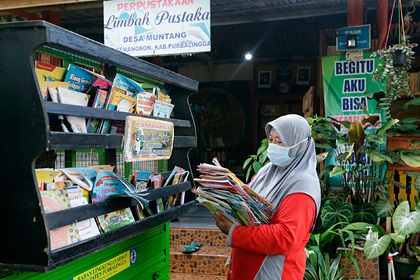In Indonesia, schoolchildren were offered to exchange waste for books from a mobile library 
Children on the island of Java in Indonesia decided to make children more literate with the help of garbage. Employees of one of the libraries suggested that students exchange waste for books in order to instill a love of reading and make the planet cleaner. Reuters writes about this.
The action was organized by a local resident Raden Roro Hendarti. She has equipped a mobile library on a three-wheeled van and delivers children's literature to the streets every day. There are six thousand books in the collection, which can be obtained in exchange for plastic cups, plastic bags and other garbage. Every week, a woman manages to collect about 100 kilograms of waste – she sorts them and recycles them.
Raden sees her mission in developing the literacy of Asian children and in involving them in saving the planet. Some regular visitors to her library go around the village on purpose in search of garbage in order to pick up the next book. The current literacy rate for Indonesians over 15 is 96 percent. However, in a September report, the World Bank predicts that amid the pandemic, it could drop sharply and leave 80 percent of young people unable to read minimum skills set by the Organization for Economic Cooperation and Development.
Another Asian country has decided to defend against the coronavirus with garbage. Thailand faced a shortage of personal protective equipment and began producing antique hazardous area suits from recycled waste. Overalls like these are not considered sterile, but provide minimal protection against contamination.